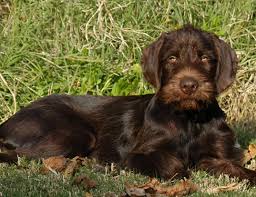PUDELPOINTER DOG
History
In the year 1881, Baron Von Zedlitz, a German breeder who specialized in tracking, pointing, and retrieving dogs cross mated a German Hunting Poodle with an English Pointer, with the former being the dam and the latter, the sire. Zedlitz’s goal was to breed an ideal gun dog which would hunt efficiently over both land and water. He wished to combine the Pudel’s love for water, retrieving, intelligence and trainability with the exemplary hunting, pointing and sniffing skills of the Pointer. Since the Pudel (German Hunting Poodle) had much stronger genes, it took Zedlitz 80 Pointers, 11 Pudels and 30 years to perfect this gun dog.
The Pudelpointer was introduced to North America by Bodo Winterhelt in 1956, who established the Pudelpointer Club of North America in Canada in the year 1977. However, this breed does not currently enjoy recognition by the American Kennel Club.
Temperament
The Pudelpointer is of a very composed, calm, inquisitive and social disposition. They exhibit enormous amounts of focus and skill, and are cordial, faithful dogs which makes them a great companion.
Bred primarily as a hunting dog, this breed is full of stamina and is not suited to a sedentary lifestyle. They are perfect for active and adventurous families who prefer the great outdoors. Although they are country dogs, they will adapt to an apartment life provided they are granted a large living space and receive a good amount of exercise daily. Lack of the essential amount of physical activity may turn them into troublemakers.
They are very gentle with children, and get along well with cats and other dogs when properly socialized and raised with them. However, they are not to be trusted around small animals and birds because of their predatory instincts.
They serve as very good watchdogs and are protective of their families. Owing to their strong retrieving genes, they also make for efficient search and rescue dogs.
Care
Exercise
GROOMING
This breed has a very low maintenance and naturally clean coat which requires no more than weekly brushing and a bath every now and then. Clip their nails and brush their teeth as required
.
HEALTH PROBLEMS
Fortunately, no notable health issues have been reported regarding this breed yet.
Training
They are intelligent, responsive dogs who are eager to please which makes them highly trainable.
Stranger Anxiety: Start socializing Pudelpointer puppies with strangers from an early stage so that they do not act too reserved or timid around strangers later on.
Obedience: The Pudelpointer requires a firm, consistent yet gentle pack leader. Start training them as early as possible for best results. Make the training interesting and be motivating in your conduct.
Destructive Habits: Make sure they receive proper obedience training and sufficient exercise to prevent them from engaging in destructive behavior.
Leash Training: Pudelpointers need to be strictly leash trained right from puppyhood or they will develop a habit of pulling at their leash. Due to their inherent small-game hunting and retrieving tendencies, avoid taking their leash off especially in an open or unsecured area. Ensure that you train them to obey commands like “No” or “Stop” efficiently before you let them off the leash.
Feeding
- 2 to 3 month old Pudelpointers require 4 bowls of food everyday
- 3 to 6 month old Pudelpointers require 3 bowls of food everyday
- 6 to 12 month old Pudelpointers require 2 bowls of food everyday
- Pudelpointers over a year old require 1 bowl or 2 half bowls of food every day, depending on their eating habit.
Interesting Facts
- Breeders have deliberately avoided official recognition of the breed by the American Kennel Club as they believe that AKC recognition would result in splitting of the breed into show dogs and working dogs.





Comments
Post a Comment